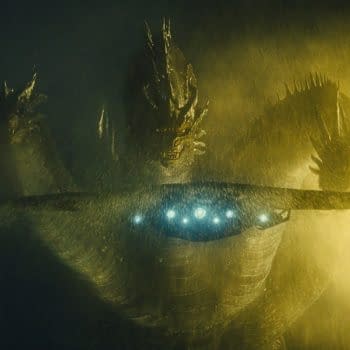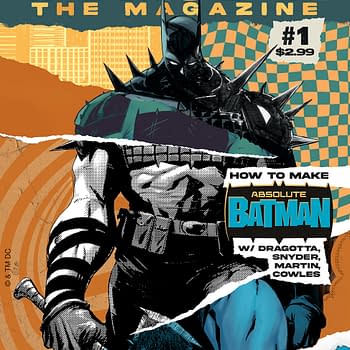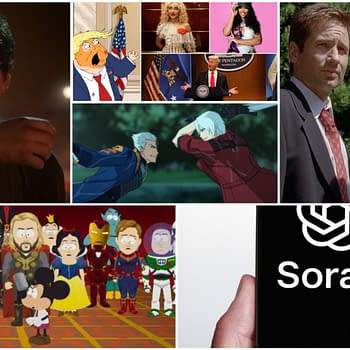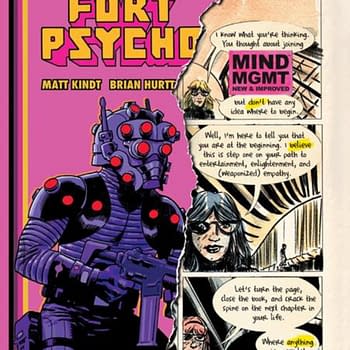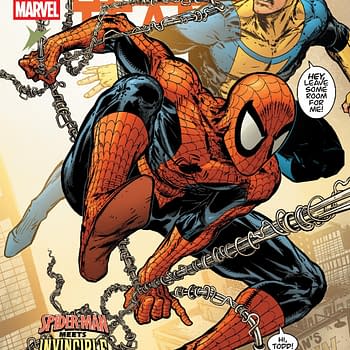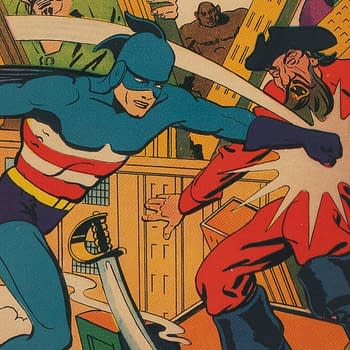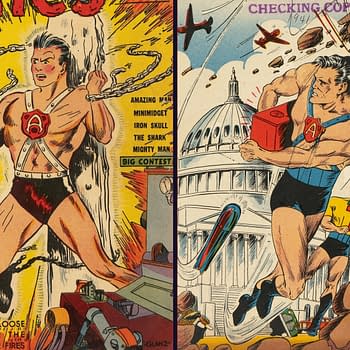Posted in: Comics, Conventions, NYCC | Tagged: black panther, Comics, HRL, marvel, NYCC
Big Names In Marvel Comics Discuss The Industry And More At The NYCC 2017 Cup O' Joe Panel
Joe Glass reports from New York Comic Con 2017:
Starting Saturday off with a nicely filled panel, as Marvel brings a special Cup o' Joe panel focusing on Marvel Legacy and the Avengers line of titles. Hosted by Joe Quesada and Tom Brevoort and featuring Al Ewing, Nick Spencer, Donny Cates, Sana Amanat, Michele Bandini, Ta-Nehisi Coates, and Jim Zub.
Quesada started by asking the room who had not been to a Cup o' Joe before, and was surprised to find a good few hands raise into the air. He then described the general structure. He joked about how they are here to ruin the industry and the fans childhoods, to which an audience member piped up that they are doing a good job.
Brevoort discussed Avengers: No Surrender, starting in January, where all Avengers titles will folks together into a massive 16-part story coming out weekly. Brevoort promises it will push the Avengers to their limit, the biggest Marvel Avengers movie they could do on paper.
Moving onto Captain America, Brevoort joked that Nick Spencer's job is done ruining Cap for everyone now, and Brevoort went on to explain that Mark Waid and Chris Samnee are bringing Cap back to what he does best: beating up bad guys.
Ewing discussed the coming of the Kirby-esque new alien race in Royals. The Progenitors have a crazy amount of power, harnessing essentially a Dyson Solar System, a World Farm. He promises giant cosmic action.
Inhumans: Judgement Day was then announced, with Al Ewing writing, Mike del Mundo on art, and a cover by Daniel Acuna. This is Earth vs the Progenitors — essentially the finale. If Inhumans ResurrXion was the start, this is where it all comes to a close. Ewing promises this is the capstone to the Inhumans story that they are telling; he's aiming very high, like an end of the New Gods type story.
On to Captain Marvel — Amanat and Bandini discussed the upcoming Legacy plot line Dark Origins, capping off the storyline they started in the first issue of Captain Marvel. Carol Danvers realizes she needs to go back and gets pulled into a place that is very familiar but also very, very scary. Bandini likes getting to draw a top female character and also praised series writer Margaret Stohl. Amanat says they are building a very big story with Carol Danvers, so stay tuned.
On to Black Panther: Coates confessed he was not a huge Ullysses Klaw fan, so this is an attempt to rethink Klaw, to give him more of a back story and a reason for his actions, beyond simply plundering vibranium. It's all part of the larger story they've been telling since issue one about the nature of power, the nature of kings, and more.
Rise of the Black Panther was then brought up, co-written with Evan Narcisse and art by Paul Renault. This is the story of the Black Panther before T'Challa. Coates says there's no one who knows more about T'Challa and Black Panther than Narcisse.
Cates goes onto Doctor Strange, discussing the Legacy plot of Loki: Sorcerer Supreme, Cates describes it as kind of like Stephen Strange's mid-life crisis, and in a lot of ways it mirrors where Stephen Strange came from. We find him broken and going to great lengths to find out who he really is and reclaim his 'throne'. Cates promises insane surprises, and says if he was a betting man, he'd go and pick up the second issue for sure.
Moving on to Thanos, Cates stripped to show off his "super-cool Thanos shirt". Thanos's pitch was so big he figured he'd be told to dial it back a bit. Thanos is his favorite character of all time, and he gets to work with his best friend Geoff Shaw. The point of the arc is that no one has ever got closer to winning than Thanos, so he wanted to show what happens when he does succeed and gets everything he ever wanted — and how that is actually terrible for him. It's brutal and hardcore and he's amazed he can keep pushing the envelope that way. He says it's his favorite thing he's ever done.
Moving on to a complete change of pace, the Marvel Super Hero Adventures books are aimed at a much more all ages feel involving all kinds of Marvel characters like Spider-Man, Squirrel Girl, and Spider-Gwen, and sharing great lessons about teamwork and friendship. And at the end of each book is a one-page comic strip to introduce kids to comics, and there will also be a comic series by the same name by Jim McCann, Dario Brizuela, and cover by Guriheru.
New novel up next: Black Panther: The Young Prince by Ronald L. Smith, a middle-grade novel. It's a story about Black Panther in his younger years, before he had become Black Panther, and his time travelling to the U.S. as a young boy. Samanat says she is very excited for the book, Smith has loads to say about T'Challa.
Then another new novel was announced: a brand-new original novel of Runaways, by Christopher Golden. Amanat says Runaways was one of the books that made her fall in love with comics and Marvel in particular, and this book is set after the end of the original Brian K. Vaughan comic arc. A young adult book.
Then it was Q&A time — when we got to that portion of the panel, the room just emptied out. Over half the room just got up to leave. But some good questions were asked:
Fans are disappointed by the partnership with Northrop Grumman; what have they learned from the backlash from that? Quesada says to be honest, he learned about it the same time as everyone else did, and they have put out a statement.
How has the transition been to comics, and any characters outside of Black Panther that wants to do? Coates says Black Panther keeps him pretty busy, and while he gets the other question a lot, but he found it pretty easy because he was a comic book fan, too. He actually almost finds it more difficult moving the other way, back to non-fiction, serious stuff.
Any consultation with the Black Panther movie from Coates? No. Fan then commented he felt that Secret Empire was a great Captain America story, and thanked Spencer, and mentioned the backlash, to which Spencer replied, "That's Twitter, man, it's crazy." He said he dealt with the backlash by focusing on those that did enjoy it, and that he feels they cannot bow to those who speak against the stories and won't change their story for others.
Quesada stepped in then to talk about his first week as Editor-in-Chief, and Tom DeFalco coming in to give him unsolicited advice, saying that if you are going to take the job, you have to have a broad back. If you don't have that, leave now for your health. Quesada praised Spencer for having a broader back than he.
On the absence of the X-Men in video games, is there a reason? Quesada says they honestly don't know the answer to that particular query. Cates does point out you can play as both Thanos and Doctor Strange, though.
A fan praised Spencer for the Sam Wilson Captain America story, and then Ewing for his two volumes of Ultimates, then directed a question to the editors. Is there any idea they immediately shot down, but it ended up going through and became a huge success, or vice versa? Brevoort says yes, kind of on both counts, but can't think of an example off the top of his head. He remembers one of his biggest arguments was before Ed Brubaker brought Bucky back, there was a different creative team that wanted to bring Bucky back and he felt that that just couldn't work. But then Brubaker came in with an answer to all of Brevoort's concerns about it, and it then wound up happening and being well received. He says that you have to be open to possibilities.
Quesada says a lot of things you put out you think will be a hit will fizzle, and mentions that the Runaways pitch had been sitting in the drawer left by a previous editor and then they saw something in it. An editor also wanted to pitch cosmic stuff, which isn't really Quesada's thing, and he gave it the go ahead and it wound up blowing up.
Inhumans: Judgement Day is a one-shot, not a series, despite the cover having an "issue #1" on it.
Advice for writers wanting to get in? Cates pointed out he was actually originally Amanat's intern, to which Amanat joked, "My worst intern." Coates says he read a lot, and you have to feel like your life will not be complete unless you do this thing. You just have to have it as an all-consuming passion. Zub says you need to tell stories that are emotionally important to you. Don't try to write something you think someone else wants to read — people connect to passionate, honest stories. Ewing says 2000 AD takes unsolicited submissions — everything gets read and gets at least one sentence of feedback. That's where he started, and that's how he's here.
Quesada says the one thing that hasn't been said yet is writers write. If you're a writer, you have to keep working. Write every day.
A fan asked about any possibility for a Puck spin-off. Cates joked he's doing a Puck book with Alex Ross. In seriousness, no plans at the moment.
Any ideas on how to isolate valuable feedback in possible missteps in representation? Quesada believes you inherently know if you made a mistake. He says they've always tried to reflect the world outside the window, but it's also about finding the right story. Quesada also pointed out the reactions aren't a new thing, he could pull out letters from old columns that are exactly like current critique online.
Coates says increasingly the artist or creator should cultivate a small group of critics that they can keep in mind for feedback, but they can't be questioning every single script based on every single piece of criticism they get out there.
On the backlash to the addition of newer diverse characters, and the worry they'd be lost in Legacy, Quesada says that launching a brand new character and having it be a hit is not the norm. It's like finding that unknown artist and have them break huge straight away and become a well known name. Quesada says you have to find a way to make it work, sometimes that's connecting to existing characters, and sometimes you need an incubation period — bringing up Deadpool as a perfect example of that. Amanat said that it was something they thought about when coming up with Ms. Marvel, and they had considered whole new superhero identities, but having the Marvel name was a big part of her success.
Spencer says it's rare with editorial for them to get feedback that an idea pitched is too crazy. No idea is too out there.

















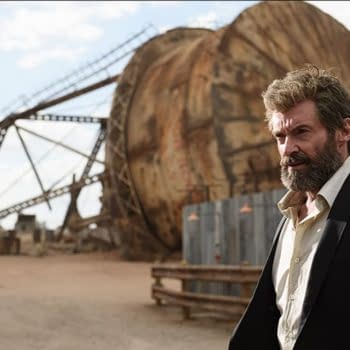
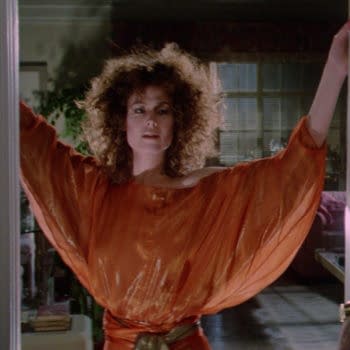
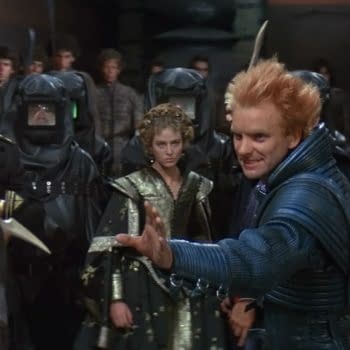
!['Rocketman' Soars With Warts and All Elton John Story [Review]](https://mlpnk72yciwc.i.optimole.com/cqhiHLc.IIZS~2ef73/w:350/h:350/q:75/rt:fill/g:ce/https://bleedingcool.com/wp-content/uploads/2019/01/rocketman.3-350x350.jpg)
